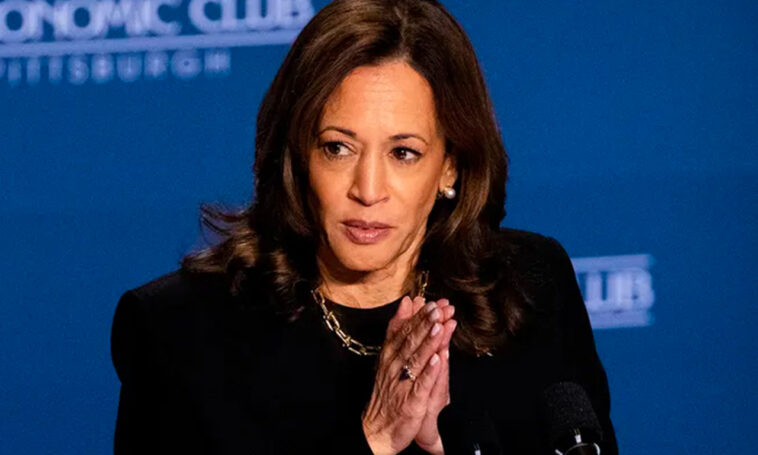Vice President Kamala Harris faces backlash for her ambiguous response about athletes standing for the national anthem.
Vice President Kamala Harris recently came under scrutiny for her lack of a clear stance on whether athletes should stand during the national anthem. This controversy resurfaced due to an unearthed interview from 2016, when Harris was serving as California’s attorney general. During this interview with PBS reporter David Nazar, she was asked directly if she believed athletes should stand for “The Star-Spangled Banner.” Instead of providing a straightforward answer, Harris delivered a lengthy response focused on Americans’ rights, which has drawn significant backlash on social media as the general election approaches.
In the October 2016 interview, Nazar asked, “Should folks stand for the national anthem?” Harris responded by emphasizing the principles enshrined in the U.S. Constitution. She spoke about equality and the freedoms Americans enjoy, including freedom of speech and the right to protest.
“We are all, and should be, treated as equals. We articulated those principles in our Constitution,” she said.
However, her answer did not specifically address the question about athletes standing for the anthem, leaving many viewers frustrated.
The topic of kneeling during the national anthem gained prominence in 2016 when former San Francisco 49ers quarterback Colin Kaepernick became the first NFL player to kneel in protest of police brutality and racism. This act sparked widespread debate and led to similar demonstrations by athletes across various sports. Notable figures, including soccer player Megan Rapinoe and MLB player Bruce Maxwell, joined the movement, further amplifying its significance.
The protests reached a peak in 2020, particularly following the death of George Floyd during an interaction with police. In response, many athletes knelt during games, and the NBA showcased a court painted with “Black Lives Matter.” These actions received mixed reactions, especially from conservative figures, including former President Donald Trump. Trump criticized the protests, suggesting that they were detrimental to sports viewership and expressed that kneeling was disrespectful to the country and its flag.
The recent resurfacing of Harris’s 2016 interview coincides with ongoing discussions about social justice in sports. Critics have pointed out that Harris’s failure to take a definitive stance on the issue reflects a broader political dilemma. OutKick founder Clay Travis remarked on social media that Harris’s response was a “long jumble of nothingness,” highlighting the frustration many feel regarding politicians who avoid direct answers on important social issues.
Harris’s past comments regarding athlete protests have varied. After her election to the Senate, she defended the athletes who knelt during the anthem, asserting that they should not be “threatened or bullied” for their actions. At an event in Atlanta, she emphasized that when Americans demand recognition of their lives, it is an expression of free speech protected by the Constitution. “Let’s speak the truth that when Americans demand recognition that their lives matter… that is an expression of free speech,” she stated, reinforcing her support for the athletes’ right to protest.
As the 2024 election season ramps up, this latest controversy adds another layer to Harris’s political landscape. Voters are increasingly looking for clarity on issues that matter to them, especially regarding social justice and civil rights. Harris’s inability to provide a clear stance on such a polarizing issue may affect her perception among constituents.
The national anthem debate remains a contentious topic in American culture. For many, standing for the anthem is a sign of respect, while for others, kneeling symbolizes the need for reform and recognition of systemic injustices. Harris’s recent responses highlight the delicate balance politicians must strike in addressing these complex issues, particularly when public opinion is divided.
As we move closer to the general election, the question of how political figures respond to social justice movements will continue to be scrutinized. Voters are looking for leaders who can articulate their beliefs and take a stand on important issues. Whether Harris’s indirect response will influence public opinion remains to be seen.
Vice President Kamala Harris’s ambiguous remarks about whether athletes should stand for the national anthem reflect a larger challenge for politicians navigating the intricate relationship between sports, social justice, and public sentiment. As the political landscape evolves, clear communication on these critical issues will be essential for gaining and maintaining voter trust. Harris’s previous defense of athlete protests contrasts sharply with her 2016 interview, raising questions about her current stance and its implications for her political future.






Join the Community and Be a Part of the Conversation
You must be logged in or registered to post a comment.